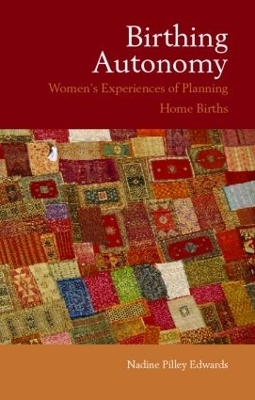
Birthing Autonomy
Women's Experiences of Planning Home Births
Seiten
2005
Routledge (Verlag)
978-0-415-35409-7 (ISBN)
Routledge (Verlag)
978-0-415-35409-7 (ISBN)
An in-depth exploration of how women make decisions about home births and what aspects matter most to them.
Birthing Autonomy brings some balance to the difficult arguments that arise from debates about home births, and focuses on women’s views and their experiences of planning home births. It provides an in-depth exploration of how women make decisions about home births and what aspects matter most to them. Comparing how differently the pros and cons of home births are constructed and contemplated by mothers and by the medical profession, the book looks at how current obstetric thinking and practices can disempower and harm women emotionally and spiritually as well as physically.
Written in an accessible style, this book is enlightening for student and practicing midwives and obstetricians, as well as researchers and students of nursing, medical sociology, health studies, gender studies, feminist practitioners and theorists. It will also be invaluable to expectant mothers who want to be more informed about the choices they are facing and the wider context within which their birth options are considered.
Birthing Autonomy brings some balance to the difficult arguments that arise from debates about home births, and focuses on women’s views and their experiences of planning home births. It provides an in-depth exploration of how women make decisions about home births and what aspects matter most to them. Comparing how differently the pros and cons of home births are constructed and contemplated by mothers and by the medical profession, the book looks at how current obstetric thinking and practices can disempower and harm women emotionally and spiritually as well as physically.
Written in an accessible style, this book is enlightening for student and practicing midwives and obstetricians, as well as researchers and students of nursing, medical sociology, health studies, gender studies, feminist practitioners and theorists. It will also be invaluable to expectant mothers who want to be more informed about the choices they are facing and the wider context within which their birth options are considered.
Nadine Pilley Edwards has worked with AIMS since 1980. She is a part-time research associate at the University of Sheffield, and lectures and writes on maternity issues in the UK and overseas. She has written numerous articles and chapters on relationships between women and midwives, informed choice, safety and risk, and research methods.
1. Home birth? What's the problem 2. What do we know? What does she know? Can anyone know anything? 3. How have we got here? Historical and current perspectives 4. What's safe and what's risky? 5. 'What I really need is support': Relationships between women and midwives 6. 'They think it's best': The ethical implications of obstetrics 7. Where now?
| Erscheint lt. Verlag | 21.7.2005 |
|---|---|
| Verlagsort | London |
| Sprache | englisch |
| Maße | 138 x 216 mm |
| Gewicht | 580 g |
| Themenwelt | Sachbuch/Ratgeber ► Gesundheit / Leben / Psychologie |
| Medizin / Pharmazie ► Gesundheitsfachberufe ► Hebamme / Entbindungspfleger | |
| Sozialwissenschaften ► Soziologie ► Gender Studies | |
| Sozialwissenschaften ► Soziologie ► Spezielle Soziologien | |
| ISBN-10 | 0-415-35409-9 / 0415354099 |
| ISBN-13 | 978-0-415-35409-7 / 9780415354097 |
| Zustand | Neuware |
| Haben Sie eine Frage zum Produkt? |
Mehr entdecken
aus dem Bereich
aus dem Bereich
Evidenz und Erfahrung
Buch | Softcover (2024)
Springer (Verlag)
CHF 69,95
eine Arbeitshilfe für Hebammen im Praxisalltag
Buch | Softcover (2023)
Kohlhammer (Verlag)
CHF 58,75
Buch | Softcover (2023)
Urban & Fischer in Elsevier (Verlag)
CHF 49,95


